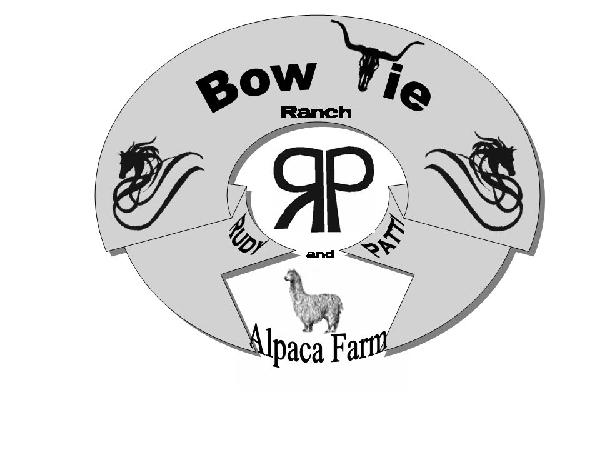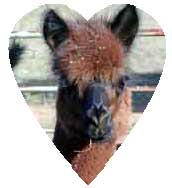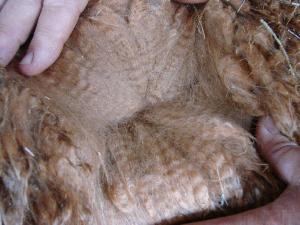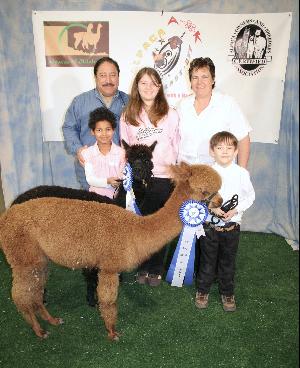|

Bowtie Ranch and Alpaca Farm
Bowtie Ranch got its name from the RPC brand (backward R next to the P) which looks like a bowtie. Patti Maness, DVM and her husband, Rudy Casias, run this 34 acre ranch. Besides their huacaya alpaca venture, they also raise horses, registered longhorns, and chickens. Dr. Maness is attending the camelid courses for veterinarians and will be adding camelid medicine to her Small Animal, Surgery referral, and Exotic practice. Bowtie Ranch is located just south of OKC in Newcastle, OK.
 Alpacas, first imported to the US in 1984, were a cherished treasure of the ancient Incan civilization and played a central role in the Incan culture that was located on the high Andean Plateau and mountains of South America. There are two types of alpacas, the Suri which has long silky fleece, or the Huacaya which has a more fluffy fleece. The North American herd has grown both by natural reproduction and through a series of imports primarily from Peru, Chile, Bolivia, Australia and New Zealand. Imports of alpacas into North America has been somewhat restrained by the Peruvian government?s attempts to avoid losing the country?s best genetic material as well as the cost and expense of transportation and the long quarantine period with the risk of disease such as foot and mouth. In 1999, the Alpaca Registry (ARI) closed its registration. No new imports could be registered. Alpacas are blood tested and DNA typed to prove their registration and pedigree. This has allowed the North American breeders to concentrate on breeding a superior animal with a superb fleece that can compete in the world market. Alpacas, first imported to the US in 1984, were a cherished treasure of the ancient Incan civilization and played a central role in the Incan culture that was located on the high Andean Plateau and mountains of South America. There are two types of alpacas, the Suri which has long silky fleece, or the Huacaya which has a more fluffy fleece. The North American herd has grown both by natural reproduction and through a series of imports primarily from Peru, Chile, Bolivia, Australia and New Zealand. Imports of alpacas into North America has been somewhat restrained by the Peruvian government?s attempts to avoid losing the country?s best genetic material as well as the cost and expense of transportation and the long quarantine period with the risk of disease such as foot and mouth. In 1999, the Alpaca Registry (ARI) closed its registration. No new imports could be registered. Alpacas are blood tested and DNA typed to prove their registration and pedigree. This has allowed the North American breeders to concentrate on breeding a superior animal with a superb fleece that can compete in the world market.
Alpacas are now being successfully raised and enjoyed throughout North America and abroad. Alpacas are small ruminants which means they chew cud and have a compartmented stomach like a cow or sheep. An adult alpaca wears 120 to 175# full grown and is as tall as an average human. They live around 20 years. A baby alpaca is called a cria (cree-uh), and they join the world weighing 9 to 18# after an 11 month long gestation period. This means only one baby a year which does keep the supply and demand high for this adorable investment. Many owners only have a few acres because the alpaca doesn't need very much room whereas other owners board (called agisting) their animals at a larger farm. They are herd animals and need to be with other alpacas (two to three minimum) but are not destructive like goats can be. They are amazing easy to clean up after because they all go in the same spot creating a communal dung pile. Many people are turning to this investment for its value as well as sheer enjoyment of these amazing personalities and fun in raising the crias. Other people have just a few fiber animals either for their use or to sell the fleece or yarn.

Alpacas produce one of the world's finest and most luxurious natural fibers, being softer and warmer than Cashmere as well as stronger and lighter than wool. At one time, only Incan royalty was allowed to wear alpaca products. They are sheared yearly which does not hurt the animal, and can produce between 3 to 15# of fleece. It comes in more colors than any other fiber producing animal (approximately 22 basic colors with many variations ). Hand spinners and weavers love working with this fiber, even though it is still considered an expensive luxury fiber. The fiber market in both small cottage industries as well as commercial mills is continuing to grow.
 Alpaca shows can be just fleece shows or animal competitions. Show events include obstacle course, public relations, showmanship, as well as the color and breed categories. There is a strong national organization called The Alpaca Owners and Breeders Association (AOBA) which sanctions and governs most of the shows. Alpaca shows can be just fleece shows or animal competitions. Show events include obstacle course, public relations, showmanship, as well as the color and breed categories. There is a strong national organization called The Alpaca Owners and Breeders Association (AOBA) which sanctions and governs most of the shows.
We are also members of some of the local organizations such as AOK (Alpacas of Oklahoma) and TXOLAN
(Texas, Oklahoma, Lousiana, Arkansas, and New Mexico), and MOPACA (Oklahoma, Kansas, Nebraska, Arkansas, Missouri, Illinois, Iowa, Kentucky, and Tennessee)
|